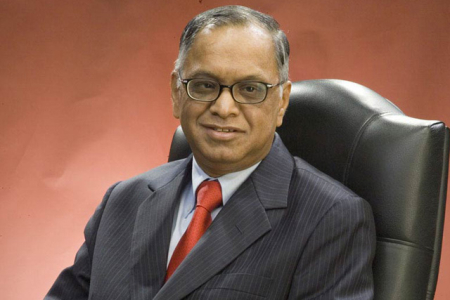Faisal Kidwai
India should piggyback on mobile phones to increase penetration and speed of Internet, says an expert.
Ramesh Govindan, Professor of Computer Science and Electrical Engineering at the University of Southern California, says growth of Internet is both a challenge and an opportunity.
Govindan, who heads the Embedded Networks Laboratory at the USC, says liberalisation does not mean innovation will follow in an interview to Rediff.com.
Here are the excerpts:
You received the B Tech degree from the Indian Institute of Technology at Madras and the MS and PhD degrees from the University of California at Berkeley. Now, you are a professor at the University of Southern California and head the Embedded Networks Laboratory at the USC. Were you always interested in technology or the love grew gradually?
I had teachers in school and college who got me interested in science and maths. I was fortunate to have good chemistry and physics teachers.
When we were growing up there was no direct access to technology and I did not have an abiding interest in it but computer science was a fashionable thing to do in those days and, as I went through the course, I realized how good I was.
...
Internet growth: Problems and challenges
Image: Internet has been a success beyond anyone's expectations.When I came to the United States to do MS and PhD, I knew I could make it. Once you taste a little bit of success you come to the realization that this is certainly something that that you would love to do.
I would say the love of technology grew gradually.
Your research focuses on routing infrastructures and on the architectures and programming systems for wireless and mobile networks. What do you think are the main global challenges facing the Internet?
Internet has been a success beyond anyone's expectations. I've been working on Internet-related topics for more than 15 years, and one example that comes to mind is the size of the Internet address.
Most people don't know this but beyond the domain names like www.com, there is a six length 32 bit address that is used for Internet host.
I used to work for Jon Postel, the Internet pioneer, and he once told me that even back in the 1960s, when they were designing the Internet, they had a debate about the length of the address because the length determines how big the Internet can grow and at that time people thought that 32 bits would be more than enough.
...
Internet growth: Problems and challenges
Image: Big challenge is to harness the online information, says Govindan.Back then they did not anticipate the success and with the success there have come a couple of challenges that I can think of.
First is the rate of growth of the Internet, both in terms of the number of users and the number of devices logged into it.
So, one challenge is how to keep up with that growth. At one point, people thought Internet will grow but it will stop when everyone has one computer, so they thought there was a natural limit to the growth of the Internet.
They thought no one will need more than one device but right now, for instance, I own two or three devices connected to the Internet and, more importantly, people are realizing that even things like cars, buses, refrigerators, surveillance systems and whole buildings can be connected to Internet, so now you have the possibility of having many more computers connected to the Internet and that's why the scaling problem is not going to go away anytime soon.
And that brings me to the second challenge, which is once you have these devices connected to the network, they start generating information about the world.
So the second big challenge is how to harness this information in ways that will improve the productivity or the lifestyle or the environment.
...
Internet growth: Problems and challenges
Image: GPS technology can help users in many ways.I was in India last month and heard this nice story, which I'm sure happens in other places too, about buses being equipped with GPS.
So passengers can now know in real time where the bus is and when it is going to arrive. Having access to that information means passengers don't have to stand in queues and can use that time in other activities.
These are small changes, but as we get more access to information about the world, we can use that in ways that can change our lives. This is both a challenge and an opportunity.
So, what should be done to keep up with Internet growth?
People realized this problem in the early 1990's when they started looking at the usage of Internet addresses.
But there is a solution. There is an Internet standard protocol called IP version six, which increases the address space to 128 bits, and it's slowly being deployed and being used in many places but not overwhelmingly sold because there is already lots of Internet infrastructure out there and to convert it to IPv6 is costly.
There will come some tipping point when people will say "okay now we need to move to IPv6". The technology is there, we know how to deal with the problem, so now it's just a matter of figuring out when to make that transition.
A lot of device and host manufacturers have implemented IPv6, so they are in some sense ready.
...
Internet growth: Problems and challenges
Image: He says implementation of IPv6 will ease the problem.Those implementations have been tested out. There are small- to medium-size networks where IPv6 is running.
In general it seems to be close to being market ready. It's just the question of the operators, the people who run the networks, to make the shift. You have to make sure that everyone has an IPv6 capable device and that's a lot of hassle. Plus, you have to make sure that customers are not unhappy with the transition.
Currently, we are at that stage.
India is behind when it comes to Internet speed and penetration. What should be done to boost Internet speed and penetration in India?
One way which works in all countries, such as South Korea, is for the government to invest heavily in high-speed Internet infrastructure. South Korea decided to make it a national priority to bring broadband connection to every resident in the country and they invested heavily and hope to recover this investment in the long term.
In India that might be harder because of the scale of the country, both in terms of geography and the population. One possible approach is for markets and companies to come in and invest in residential services to consumers and entice them.
...
Internet growth: Problems and challenges
Image: In some countries, TV, Internet and phone all have single connection.But this approach is difficult in India again because of the scale and because of the last mile problem.
Getting high-speed connection to homes is a significant investment. If you want to get joint cables to every house then it becomes a significant problem.
Although in some countries people have done that. Companies have been incentivized to do that because they realize that once you have a high-speed connection to the home, you can sell a lot of services through that single network.
For instance, I have TV, Internet and phone all through that single connection. Companies see the value and are willing to invest that capital, because they know they can recover that in the long term.
In India, there could be a third approach and that is to piggyback on mobile-phone market. The world has been amazed at how much mobile-phone devices have penetrated throughout the country in India.
Now, slowly there is an increase in the use of smartphones, especially in metropolitan areas, and these are Internet-connected devices, so one possibility is, as people upgrade to these mobile devices with Internet capabilities, companies can piggyback on these phones and that would not only increase the penetration of Internet but also force the government and companies to build infrastructure for high-speed connectivity.
...
Internet growth: Problems and challenges
Image: Smartphones can increase Internet penetration in India, says Govindan.Although it's a little bit hard to say whether it will happen because a lot of it depends upon business, regulatory practices and pricing. But it seems to be an attractive option in India. If it does happen, it will get more people connected than they are now.
In the past few decades, India has seen growth of some big IT companies, such as Wipro and Infosys. But, unfortunately, we aren't seeing major technological innovations happening in India nor we are building products that can have an impact on the global scale. Why do you think there is a gap in innovation and world-class software products?
I have a slightly different take on that. One thing to realize is that India is not alone in this regard. Even European countries don't have something like the equivalent of a Silicon Valley where they are generating a lot of innovation.
The real problem could be one of expectation. Perhaps people think that simply by liberalizing the economy, innovation will follow. What you need are institutions and building and developing institutions take a fair amount of time. One example in the US is the strong intellectual property protection that exists for individual innovation. Other countries can develop this but it takes time.
...
Internet growth: Problems and challenges
Image: Apple's Steve Jobs.The other is, of course, the focus on research and development. Universities are supported by government funding and they try to train people to think creatively and disruptively. The third element is the cultural mindset, but that again takes time to develop.
The best example is Apple's Steve Jobs. To think that you can make a name in the world is one thing, but to actually believe it is something totally different. In order to have innovation you have to have people who have the confidence that they can actually achieve their dreams and so you have to have many examples of these local successes and then people build up in their cultural mindset that focus on innovation.
India has a lot of strong points that will with time make it a place where innovation happens. For instance, there is a strong entrepreneurial business class in India and that means innovators will be able to find business partners. It will happen, but it has been just 20 or so years for liberalization, so it will take few more years.
...
Internet growth: Problems and challenges
Image: Infosys chairman emeritus N R Narayana Murthy.In October, 2011, Infosys chairman emeritus N R Narayana Murthy said the quality of students entering Indian Institutes of Technology has deteriorated over the years. You are an ex-IITian and a professor at one of America's top universities, how do you rate the caliber of Indian students?
I don't think the caliber; the raw talent of students in India has dropped. In a given population, there will always be some really smart people.
What I am seeing is that the number of students coming for research has dropped. The number of students who want to pursue knowledge for the sake of knowledge has fallen, but I'm not surprised by that because that is happening across the board.
Students these days are less motivated to work harder and do more deep work just because the opportunities are much more these days than there were couple of decades ago.
Nowadays many students are getting cushy job just after graduation, so they feel less inclined to go for PhD because they know they will get only a fraction more if they complete PhD.
But this is not limited only to Indian students. Very few American students end up wanting to do PhD.
Again that's because there are much more lucrative opportunities elsewhere so it's much harder to motivate people to take up some of these deeply technical field.
...
Internet growth: Problems and challenges
Image: He says Internet monitoring is justified in some instances.Governments across the world, including the US and India, are trying to control and/or monitor Internet. Do you think steps to monitor Internet are correct?
I have a sort of multiple shades of grey answer to this question. In some cases there are important reasons why Internet monitoring is maybe valuable. Personally, I would be happy if the government said we do this for national security reasons and for increasing your security or safety.
People would buy that level of monitoring or that use of monitoring. What's wrong is to control the Internet to circumference the will of the people. What you saw in Egypt and other places is a perfect example. That kind of control seems wrong to me.
What we really need is sort of a system of checks and balances where people who independently review the kind of control that are being placed and then make it available to the general public.
A free and independent press and a network of organizations that are dedicated to exposing questionable Internet monitoring and control can help keeping the checks and balances. That is the kind of bodies or institutions we need in order to find the right balance between personal freedoms and control.
For instance, in the US, there has always been a small number of people who make their life work to expose excessive monitoring. Recently, there was a report that a major computer manufacturer was collecting location data and then there was a scandal about a company that was recording information from mobile phone and collecting them centrally. Nearly, all US-based carriers were recording information.
So these kinds of reports come out and it is helpful to have them out in the open and get the public opinion and take measures or introduce appropriate legislation. It's a complex question without a simple answer.
It's just sort of trying to find the right balance.











article